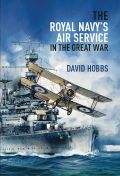In a few short years after 1914 the Royal Navy practically invented naval air warfare, not only producing the first effective aircraft carriers, but also pioneering most of the techniques and tactics that made naval air power a reality.
By 1918 the RN was so far ahead of other navies that a US Navy observer sent to study the British use of aircraft at sea concluded that any discussion of the subject must first consider their methods. Indeed, by the time the war ended the RN was training for a carrier-borne attack by torpedo-bombers on the German fleet in its bases over two decades before the first successful employment of this tactic, against the Italians at Taranto.
Following two previously well-received histories of British naval aviation, David Hobbs here turns his attention to the operational and technical achievements of the Royal Naval Air Service, both at sea and ashore, from 1914 to 1918. Detailed explanations of operations, the technology that underpinned them and the people who carried them out bring into sharp focus a revolutionary period of development that changed naval warfare forever. Controversially, the RNAS was subsumed into the newly created Royal Air Force in 1918, so as the centenary of its extinction approaches, this book is a timely reminder of its true significance.
